Forum, Latvia, Round Table
International Internet Magazine. Baltic States news & analytics
Friday, 18.07.2025, 13:02
Trade Unions in Latvia: problems and perspectives
 Print version
Print version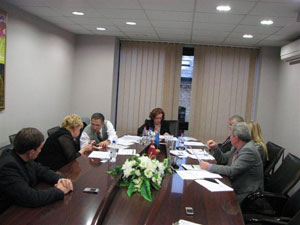 |
|---|
| The round table in Riga. |
Numerous issues have been discussed during the round-table’s work which lasted a couple of hours. Several papers have been prepared for the round-table discussions together with the additional information materials presented, e.g. excerpts from the book on Teamsters’ Union and special papers’ dispatches from as far away as Canada and Denmark.
The BC’s Editor-in-chief Mrs. Olga Pavuk (and round-table’s moderator) revealed Latvian union’s development history and present union’s situation in the country. The unions’ membership reduced during last 20 years from about 70% to a fraction of 15%. During the independence period the unions’ property (dwellings, houses, resorts, etc.) have been nationalized and unions were deprived of all their essential assets.
Unions are almost non-existent at the SMEs level “uniting” only those employed in various public sectors: thus one of the biggest unions in the country is the Science and Teachers’ Union (with about 56 th members) and the second in line is the hospital workers’ union with 20 th members. The total union’s membership in Latvia is around 165 thousand divided among 21 sectoral unions.
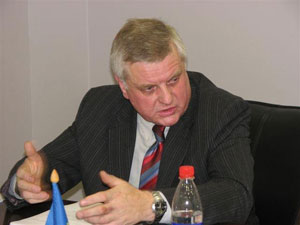 |
|---|
| Peteris Krigers. |
Peteris Krigers, Latvian Independent Unions’ Association, chairman said that Latvian unions have acquired the competence to defend their members’ rights in the court of law, the possibility which did not exist in other EU member states. He argued that a good partnership occurred between the employer and workers in the instances where the union played a significant role at a company level. However, he mentioned, the unions are often regarded as a hindrance to the company’s activity and often administration exerts pressure on them.
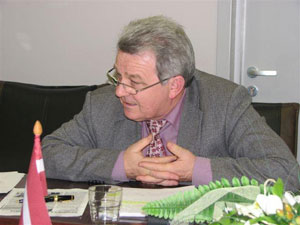 |
|---|
| Savelij Semenov. |
Savelij Semenov, Latvian Railway Workers Union, chairman (the Union is one of the biggest in Latvia) argued that country’s unions were facing a hard time at the present moment of tough competition and economic crisis. He reminded that union’s development have been always associated with the social-democratic movement, but the latter’s influence is fading presently, and so is that of the union’s. He defended the sectoral approach to union’s organisation instead of a territorial one supported by the social-democrats.
Quite interesting from a western point was Mr. Semenov’s argument on increasing union’s role in providing private loans to its members, the activity presently non-existent in other Eu member states.
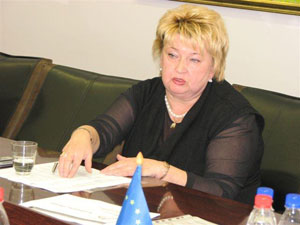 |
|---|
| Zoja Semenova. |
Zoja Semenova, Latvian Communication Workers Union, president expressed a common opinion that a fruitful three-party’s dialogue was necessary among the unions, employers associations and the state authorities. And more transparency is needed at the decision-making level.
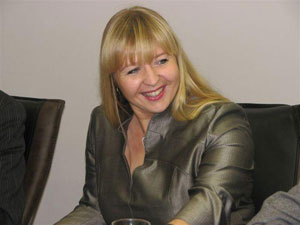 |
|---|
| Elina Egle. |
Elina Egle, general director, Latvian Employers Confederation underlined the importance of a dialogue between the unions and employers’ associations. This dialogue is the cornerstone of the social protection and workers’ rights in Latvia.
Nikolaj Kabanov, Latvian Member of Parliament together with the “distant participants” (the latter prepared for the round-table special papers, e.g. Canadian expert, Michael Bazilinski and Latvian law professor from the city of Daugavpils, Aleksandr Bajkov) underlined the importance of unions in supporting an adequate social life in the country. In the situation when the state does not posses necessary resources to protect social rights it is the union that can retain this competence in the last extent.
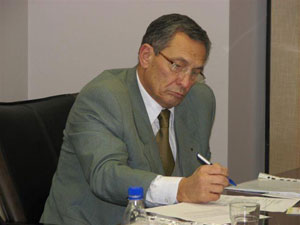 |
|---|
| Eugene Eteris. |
Eugene Eteris, BC’s International Editor in his article “Labour unions in the context of the EU policies: single market & social guarantees” (see in our magazine, English version) underlined that labour relationships have never been the primary aim of the European integration. At the same time, various aspects of labour union’s activity played essential role in the EU single market’s integration. Labour movement in Europe is more than hundred years old, with the traditions being generally of a national character. Labour issues entered the EU agenda in 1985 in order to stay there through the EU “social dialogue” and “European social model”.
Full account of the materials and discussions at the round-table could be found in the BC’s Russian language version.








 «The Baltic Course» Is Sold and Stays in Business!
«The Baltic Course» Is Sold and Stays in Business!

